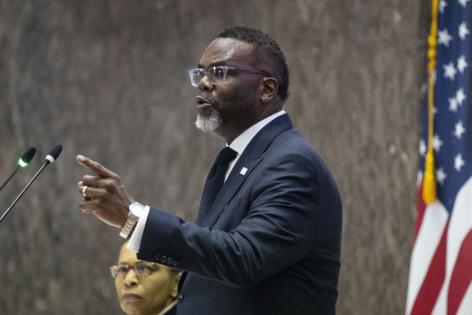Chicago Mayor Brandon Johnson floating change to head tax proposal, sources say
Published in News & Features
CHICAGO — Mayor Brandon Johnson’s team has been floating a change to his corporate head tax proposal that would increase the minimum size of companies affected from 100 to 200 employees, sources told the Chicago Tribune.
The mayor’s team this week has begun asking some members of the City Council if they would support the $21-per-employee-per-month tax if it applied only to the larger companies, according to three sources familiar with budget discussions. Johnson wants the enact the head tax on the smaller companies as well, but he is struggling to convince 26 out of 50 aldermen to vote for that.
Asked Wednesday morning about the potential head tax change, mayoral spokesperson Cassio Mendoza did not answer directly. In a statement, Mendoza said “conversations are ongoing with Aldermen on a number of potential changes,” but “no final decisions have been made at this time.”
Johnson last month proposed a $16.6 billion spending plan that must be finalized before the end of this year. His big pitch to bring back the head tax and use a projected $100 million in revenue to replace expiring funds for public safety programs has divided the City Council.
To fill the hole left by raising the head tax floor to 200 workers, Johnson would seek to additionally hike the city’s personal property lease tax, the sources said. It was not immediately clear where the new number would land.
The personal property lease tax is currently at 11% and would go up to 14% under the mayor’s initial 2026 budget proposal in order to net $333 million. The mayor has labeled that a “tax on big tech,” though it is not levied directly on the cloud companies but rather Chicago businesses using their services. It also applies to other infrastructure leases such as rental cars.
The latest behind-the-scenes negotiations comes as the mayor’s third budget cycle is shaping up to be another grueling fight, given the perfect storm of the city’s difficult fiscal issues and constraints on how it can raise new revenue.
With the mayor trying to avoid another attempt to raise property taxes, he has turned to the head tax as a way to raise a significant amount of money without needing state approval. A frustrated Johnson has at times challenged aldermen who are negative on it to come up with a better solution to address the city’s structural deficit.
In his opening budget bid, Johnson wanted to charge the head tax on companies with more than 100 employees who work more than half their time in Chicago. That means it would cost an employer with 101 workers just shy of $25,500 annually. For larger companies that have thousands of people on their payrolls — Chase, AT&T, Walgreens, American and United Airlines, Jewel-Osco, Allstate and Aon — the head tax tab would be magnitudes higher.
But aldermen across the city have expressed reservations that the levy — billed by Johnson as the next frontier in his tax-the-rich agenda — would drive out businesses, even smaller ones. For example, some restaurant operators who own multiple locations would surpass the 100-worker minimum.
Bumping that floor up to 200 would cause other issues, however. The mayor’s $100 million revenue estimate from the 100-worker-minimum version of his levy — already doubted by some skeptics given that Chicago’s old head tax generated about $20 million in annual revenue before its 2014 repeal — would plug in funding for antiviolence programs that he said he is not willing to negotiate away.
Besides $18.6 million that would go toward outside grants for those street outreach organizations, other allocations include $48.9 million to sustain youth job funding on top of smaller pools for violence interruption programs, resources for domestic violence survivors and 31 professional counseling jobs with Chicago police, documents show.
Most of those jobs and programs were buoyed by federal stimulus dollars under President Joe Biden that are expiring this year — except for the Chicago police positions, which have been under the city’s Corporate Fund. Johnson has sought to make the case that under Republican President Donald Trump’s second term, Chicago is under attack and needs his budget plan’s spending priorities to protect itself from what he deems “Trump cuts.”
However, the Tribune reported that the city’s $1.19 billion deficit for next year isn’t driven by federal cuts this year but mostly longstanding fiscal issues that long predated Trump, as well as Johnson. Still, there is a lot at stake politically for the mayor to usher this tax over the finish line, not just for the $100 million hole in the budget but also to shore up his base given past failures with enacting his progressive revenue agenda.
----------
—The Tribune’s AD Quig and Jake Sheridan contributed reporting.
____
©2025 Chicago Tribune. Visit at chicagotribune.com. Distributed by Tribune Content Agency, LLC.







Comments